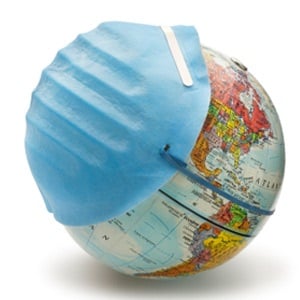
The Global Health Security Agenda was formed to take on such outbreaks whether they are natural, accidental or intentional, as in the case of a biological weapon.
Read: 2 new diseases may spark global outbreaks
Meeting in Washington, DC, the countries include several that have been Ground Zero for recent outbreaks of potentially fatal contagious illnesses such as H7N9 bird flu, which was detected in China a year ago, and Middle East Respiratory Syndrome, which was first reported in Saudi Arabia in 2012.
We are all vulnerable
The initiative is a tacit recognition that the vast majority of countries are poorly prepared to detect, let alone contain, disease outbreaks, and that their failure to institute effective disease-surveillance and -control systems poses a global threat. "In our interconnected world we are all vulnerable" when countries lack the will or the ability to detect and contain infectious-disease outbreaks, Laura Tollgate, senior director for Weapons of Mass Destruction Terrorism and Threat Reduction at the US National Security Council, told reporters ahead of the meeting. "Disease threats spread faster than ever before," and "outbreaks anywhere in the world are only a plane ride away" from everyplace else.
The Pentagon, too, is involved, already spending nearly $300 million a year to build laboratories and other health-security infrastructure overseas. "The global threat (of disease outbreaks) requires the Department of Defense to innovate," said Andrew Weber, assistant Secretary of Defence for Nuclear, Chemical and Biological Defence Programmes.
Epidemics preventative measures
The Global Health Security Agenda aims to prevent avoidable epidemics by, for instance, keeping to a minimum the number of labs worldwide that store dangerous microbes and by extending vaccination programmes.
Another goal is to detect threats early, such as by strengthening and linking disease-monitoring systems of individual countries, developing real-time electronic reporting systems, and promoting faster sharing of biological samples, such as throat swabs and blood samples from people with a new form of influenza.
Long way to go
Experts in global health security say there is a long way to go before such goals are achieved, as evidenced by failures to meet targets set by an earlier pact.
Under a legally-binding 2005 agreement overseen by the World Health Organization, for instance, 194 countries vowed to improve their capacity to prevent, detect, report and respond to public health threats of international concern.
They included novel diseases, such as new strains of influenza and outbreaks of known threats such as Ebola. In particular, countries are required to focus on outbreaks that may constitute a global health emergency.
The countries had until June 2012 to meet the core requirements, such as strengthening surveillance systems to detect emerging diseases. 84% failed to do so, said Rebecca Katz of George Washington University, an expert in global health security.
The reasons included lack of scientific capacity to conduct disease surveillance, such as to detect a new bird virus spreading to people, too few trained epidemiologists and the fact that "some things are just plain hard, like being able to detect and contain a disease at points of entry into a country," said Katz.
Touchier issues have also slowed efforts to improve the early-warning network for emerging diseases, such as Indonesia in the last decade invoking "viral sovereignty". That nation argued it was unfair to expect it to ship flu samples to western labs that could be used by pharmaceutical companies produce a vaccine that would then be sold at prices that most Indonesians could not afford.
Sample collection agreement
It took four years of tense negotiations before Indonesia reached a 2009 agreement to share disease samples.
US Health and Human Services Secretary Kathleen Sebelius and Assistant to the President for Homeland Security and Counterterrorism Lisa Monaco are scheduled to give opening remarks at the launch of the agenda.
In addition to continuing Pentagon spending for global health security, President Barack Obama has asked for $45 million in additional funding for the Centres for Disease Control and Prevention next year to expand pilot programmes, such as those in Uganda and Vietnam.
In Uganda, for instance, CDC worked with local public health agencies to set up a system for collecting blood and other samples from patients, racing them via motorcycle courier to the capital for testing, and quickly sending back the results so the local clinic knew what it was dealing with. "We have the ability to make both the United States and the world substantially safer from infectious threats," said CDC director Dr Tom Frieden.
Read more:
Whooping cough outbreak concerning




 Publications
Publications
 Partners
Partners














